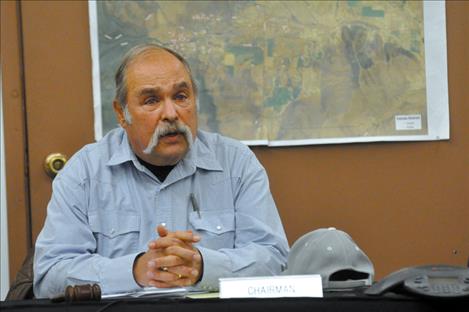Irrigation board ramps up lobbying efforts
Hey savvy news reader! Thanks for choosing local.
You are now reading
1 of 3 free articles.
ST. IGNATIUS – The Flathead Joint Board of Control is ramping up its lobbying efforts in Helena to stop the proposed Confederated Salish and Kootenai Water Compact pending before the state legislature.
The board voted 7-2 and 7-3 to spend up to $22,000 to pay for lobbyist Gary Forrester and public relations specialist Margaret Morgan.
The board is currently spending $15,000 per month for lobbyist Abigail St. Lawrence to work approximately 20 hours per week on the issue, which would finalize water rights for the Confederated Salish and Kootenai Tribes. It would also specify how much water is available to the Flathead Indian Irrigation Project. The board has opposed the compact because it does not give bare legal title of the irrigation water to the Flathead Joint Board of Control, would create a water management board presiding over future water allocation on the Flathead Reservation, and has not been proved to meet historic water use of farmers to the satisfaction of the irrigation board.
St. Lawrence said the public relations specialist will work to send legislators information blasters about the board’s opposition to the compact every couple of days.
“The idea is to have little blurbs,” St. Lawrence said. “The problem is that if you try to put it into one huge document they just don’t digest that. Instead, put it into much smaller pieces for them.”
St. Lawrence said there are eight legislators that hail from the Clark Fork area who are possibly on the fence about the compact.
“They are persuadable on this issue,” St. Lawrence said. “We are up against anywhere between a dozen and 20 other lobbyists on this issue. Right now there are three of us working (against the compact).”
Commissioner Boone Cole reasoned that spending the money now was cheaper than fighting in court later. Cole said that if the compact passes, he’s committed to “fighting this ‘til the end” and attempting to send legal grievances to the United States Supreme Court.
“Money will never be better spent than now,” Cole said.
But some members of the public were upset that the board is spending money without an irrigator referendum.
“You are spending (irrigators’) money without their approval,” irrigator Giles Gordon said. “No steps have been taken to ascertain whether the majority of the irrigators approve of (the board’s actions) or not.”
Board members pointed out that in the past two election cycles, the majority on the board who oppose the compact has grown.
“That’s how representative democracy works,” Board Chairman Jerry Laskody said. “You don’t always like it. I don’t like Obamacare, but there’s nothing I can do about it except go to the ballot box and change things. You will have the opportunity to do that this spring, in the spring elections.”
Others thought the money was well spent.
“You are trying to pinch dollars to save pennies,” irrigator Roy Vallejo said. “I agree if you have to spend the dollars to get it, because the other side is going to spend dollars. I don’t want to hesitate to spend it.”
The proposed compact was set to be heard in the Senate Judiciary Committee as the Valley Journal went to press on Monday. Commissioners were cognizant of the fact that if the bill dies in committee, it won’t necessarily mean the fight is over. Both parties in the House of Representatives have the opportunity to bring six bills to the floor of the legislature even if they die in committee.
















